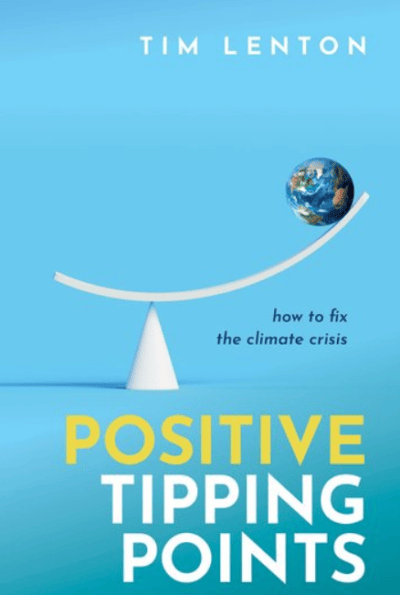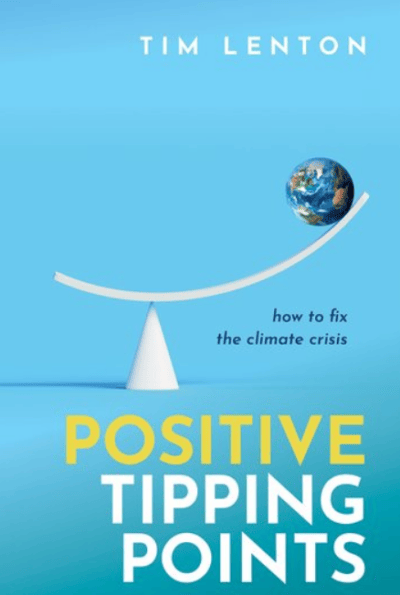
We look at Positive Tipping Points How to Fix the Climate Crisis by Tim Lenton OBE, Chair in Climate Change and Earth System Science, University of Exeter. See more about the book here.
Positive Tipping Points How to Fix the Climate Crisis, reviewed
We are that point where the interventions and the solutions need to be more drastic, more timely and are much more pressing. Arguably we have already passed many, too many, indicators that suggest humanity has triggered unavoidable changes to our climate and the planet we live on. While climate deniers, suitably funded by vested financial interests aim to negate, cloud and confuse the dialogue by flooding the debate with bad actors and bad science, the data is there, and this is not a time for giving all opinions equal weight. Already even at an anecdotal level, everyone can see that European summers are just getting hotter and hotter, and hotter. When tour guides in Rome die from heat exhaustion, surely the canary in the coalmine is singing loud and clear now, before it expires too.
Tim Lenton aims to make the case for why we are in the dire straits that we currently face, with well written and accurate explanations of various tipping points the climate has endured. The first half of the book is occupied with this aspect. Naturally, for us at least, we were most interested in Lenton getting his teeth into what he believes are potential positive tipping points. His logic is plausible, systems can change far quickly than people realise, both negatively but also positively too. A key aspect of this is the difficulty of people to understand the impact of exponential change. Lenton demonstrates that solar power, and renewables in general are surging ahead, aided by the double whammy of falling costs allied with wider adoption. Both of which, combined, bring crossover benefits, and create a virtuous cycle of further growth and price falls. Regardless of fossil fuel lobbyists, the price per unit of renewables continues to tumble, with the positive consequences that subsidies are no longer even needed for it to be a cheaper option than fossil fuel. This is regardless of the trillions of subsidies now paid, counter intuitively to the fossil fuel industry. Soon it will make more sense to simply leave it in the ground. Naturally those countries whose revenue
More about the book
We can all play a part in triggering positive tipping points that accelerate us out of the climate crisis.
How do we get out of a climate crisis of our own making?
As global change escalates, we are already starting to experience damaging tipping points in the social, ecological and climate systems that we depend upon – and much worse is to come. These shocks tell us we have left it too late for incremental change to save us: we need to change course fast to avoid the worst, yet we are acting far too slowly. Our supposed leaders appear paralysed by the complexity of the situation or, worse still, determined to maintain the status quo. This is leading to increasing despair, especially among young people.
At the same time, hopeful signs of change are also growing fast. The climate movement, the spread of electric vehicles, and the rise of renewable energy are all examples of change accelerating in the right direction. They have all passed tipping points where their uptake becomes self-propelling, taking the status quo by surprise – and they are spreading worldwide. To get ourselves out of trouble in time, we need more of these positive tipping points towards global sustainability, which eliminate greenhouse gas emissions, reverse the destruction of nature, and promote social justice.
This book identifies the positive tipping points that can help us avoid the worst from damaging tipping points. It takes the reader on a journey through understanding how tipping points happen, showing how tipping points have transformed human societies in the past, and facing up to the profound risks that climate tipping points pose to us all now. Then, it offers hope and empowerment in a series of uplifting examples of social and technological changes that started small but are already spreading rapidly to transform our societies to a more sustainable state. It identifies the positive tipping points that are still needed, the forces that are opposing them, and the actions that can trigger them, showing how we can all play a part in triggering positive tipping points that accelerate us out of the climate crisis.
More about the author
Tim Lenton OBE, Chair in Climate Change and Earth System Science, University of Exeter
Professor Tim Lenton OBE is Chair in Climate Change and Earth System Science at the University of Exeter, where he founded the Global Systems Institute. His research focuses on understanding how life has transformed the Earth system over the past 4 billion years, and how humans are transforming it now. He uses computer models to simulate the climate and biogeochemical cycles. Tim is renowned for his work in identifying climate tipping points, which informed the setting of the ‘well below 2°C’ climate target. He is passionate about the opportunities for positive tipping points in human activities to accelerate action towards global sustainability.
See more reviews here.
